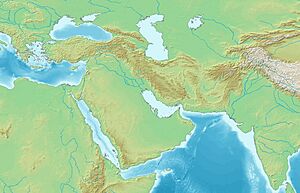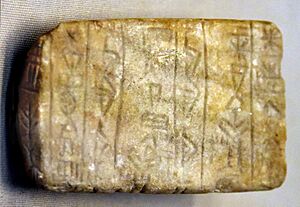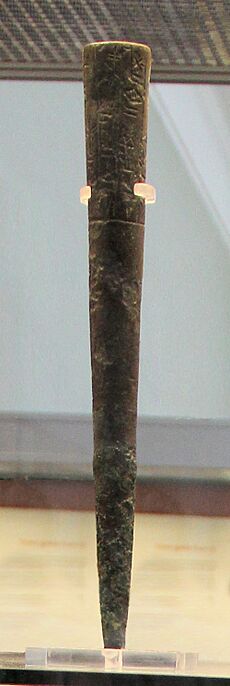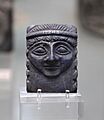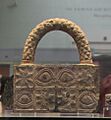A'annepada facts for kids
Quick facts for kids A'annepada𒀀𒀭𒉌𒅆𒊒𒁕 |
|
|---|---|
| King of Kish, King of Ur | |
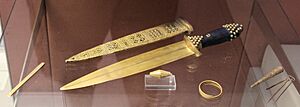
Gold dagger from tomb PG 580, thought to belong to A'annepada.
|
|
| Reign | fl. c. 2600 BCE |
| Predecessor | Mesannepada |
| Successor | Meskiagnun (brother) |
| House | First Dynasty of Ur |
A'annepada (Sumerian: 𒀀𒀭𒉌𒅆𒊒𒁕, romanized: Aanépàdda) was an important king from ancient Mesopotamia. He ruled the city of Ur around 2600 BCE. Ur was a very powerful city-state at that time.
A'annepada was the son of another famous king, Mesannepada. Some historians believe that his tomb might be a special burial site called PG 580 in the Royal Cemetery at Ur.
Messages from the Past
Ancient kings often left messages to show their power. A'annepada did this too.
Votive Tablets
A votive tablet is a special stone or clay tablet. People dedicated these tablets to gods. They were often placed in temples.
Several tablets with A'annepada's name have been found. These tablets were dedicated to the goddess Ninhursag. They also proudly state that Mesannepada was his father.
One tablet says:
"For Nin-hursag: A'annepada, king of Ur, son of Mesannepada, king of Ur, built the temple for Ninhursag."
—Dedication tablet by King A'annepada, British Museum, BM 116982.
This shows that A'annepada built a temple for the goddess Ninhursag. It also highlights his connection to his father, King Mesannepada.
Foundation Cone
Another important object found is a foundation cone. This cone is made of a copper alloy. It was discovered in Ur.
This cone has an inscription dedicated to the goddess Inanna. It is now kept in the British Museum.
The cone was found in 1854 by an explorer named John George Taylor. It was discovered with two other special items. These items were likely placed together as a foundation deposit. This means they were buried to bless a new building.
The cone is about 34 centimeters long. It weighs about 1.7 kilograms. For many years, the message on the cone was not understood. It was finally translated in 1928.
Royal Treasures from Tomb PG 580
Historians believe that tomb PG 580 in the Royal Cemetery at Ur might be A'annepada's burial place. This tomb contained many amazing objects. These items give us clues about the wealth and art of ancient Ur.
 | May Edward Chinn |
 | Rebecca Cole |
 | Alexa Canady |
 | Dorothy Lavinia Brown |


